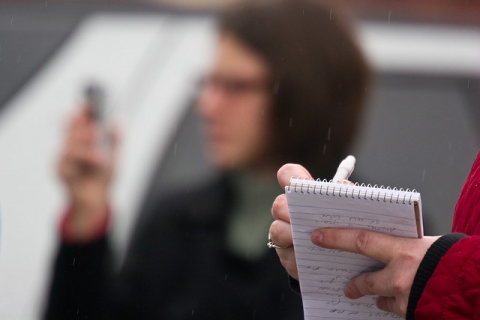
Investigative reporting and more from our Knight Fellows in this week’s roundup.
Spotlight on investigative reporting in Africa
Knight Fellow Justin Arenstein presented the recent work of the African Network of Centers for Investigative Reporting (ANCIR) at the International Journalism Festival in Perugia, Italy.
ANCIR, which was founded by Arenstein, has been integral to exposing the hidden networks of the Italian mafia in Africa. In a joint investigation with the Investigative Reporting Project Italy and CORRECT!V, ANCIR details the Italian mafia’s control of Africa’s diamond empire and the intricate network of proxies used to hide and launder money. The work was picked up by Mail & Guardian, a well-known online news site in Africa.
In other Africa-related news, ICFJ Knight Fellow Friedrich Lindenberg helped ANCIR and a coalition of investigative organizations expose the World Bank’s “broken promise” to “protect the poor.” The International Center for Investigative Journalists, The Huffington Post, El País, The Guardian, Fusion, The Investigative Fund, the GroundTruth Project, Brazil’s Agência Pública and Nigeria’s Premium Times all published their investigations, drawing global attention and a response from the president, Jim Yong Kim, at the World Bank Group’s 2015 spring meeting that the Bank would review its resettlement policies.
Mapping risk in Veracruz
Using mapping data and the risk assessment app, Salama, ICFJ Knight Fellow Jorge Luis Sierra identified extreme-risk municipalities for journalists in Mexico. This data empowers media organizations to make better informed decisions about where to send journalists.
“Geographical information and risk analysis data have proved to be crucial in editorial planning, public policy design or budget allocation,” Sierra wrote in his analysis. “With this data, media organizations would be able to take informed decisions and arrange security measures for local correspondents or for reporters who travel to those areas.”
A word from our fellows
Former ICFJ Knight Fellow Mariana Santos was featured in the spring 2015 edition of the International Symposium on Online Journalism (ISOJ) journal. Santos spoke about the power of images and interactive content at the ISOJ conference. Check out the discussion in the video below.
In case you missed it...
Code for Africa’s Nick Hargreaves produced a timeline titled Kenya Under Siege. The timeline reveals the country’s history of terrorism. Using data journalism and interactive content, Hargreaves visually details the extent and frequency of violence.
Main image CC-licensed by Flickr via Roger H. Goun.
This post is also published on IJNet, which is produced by ICFJ.